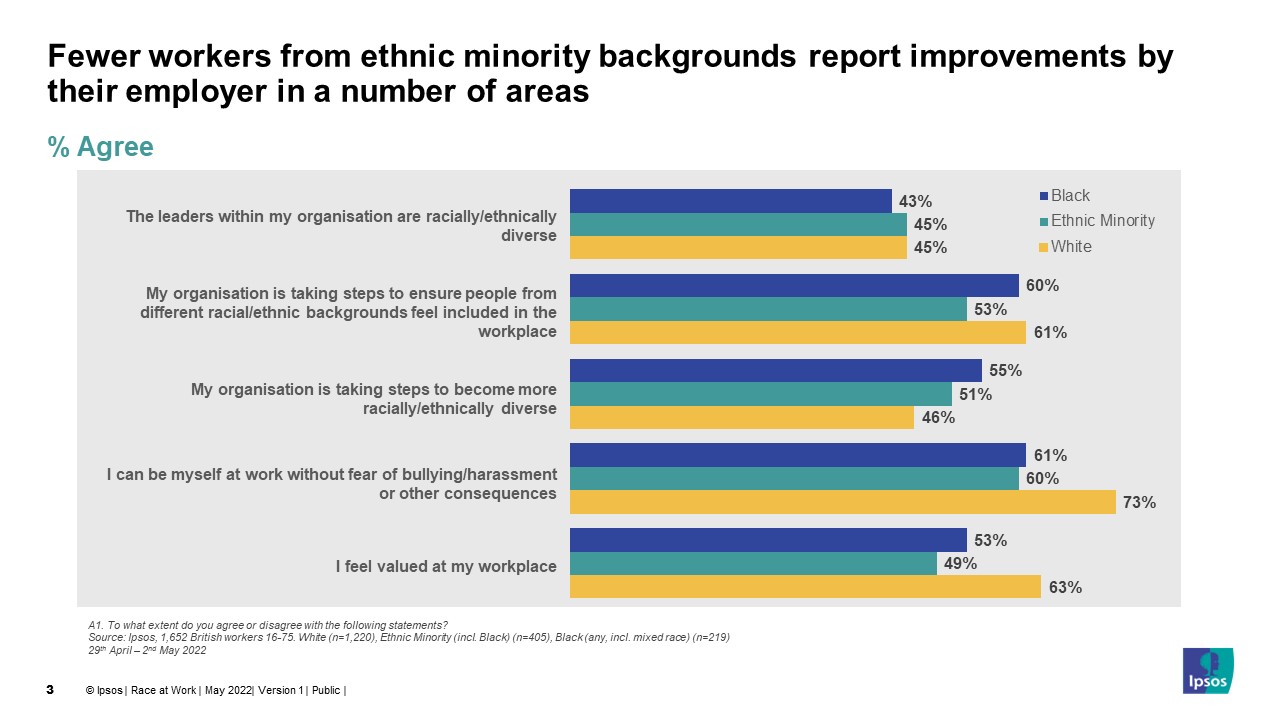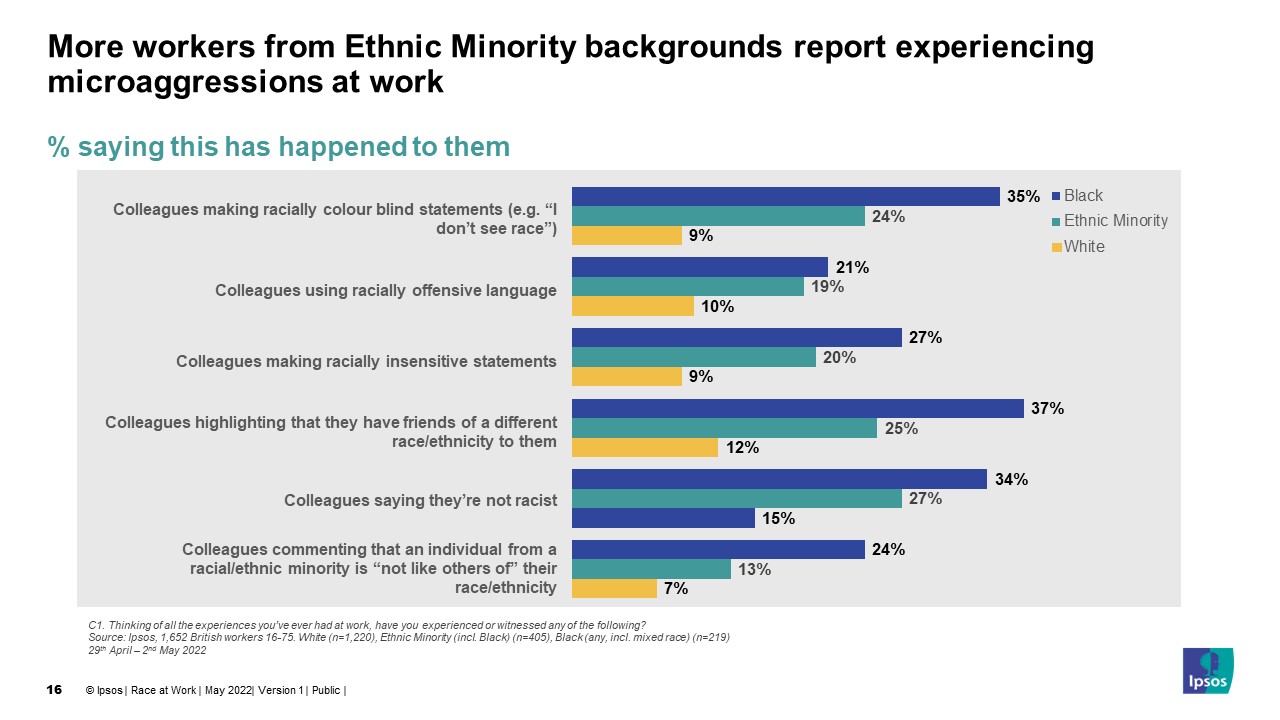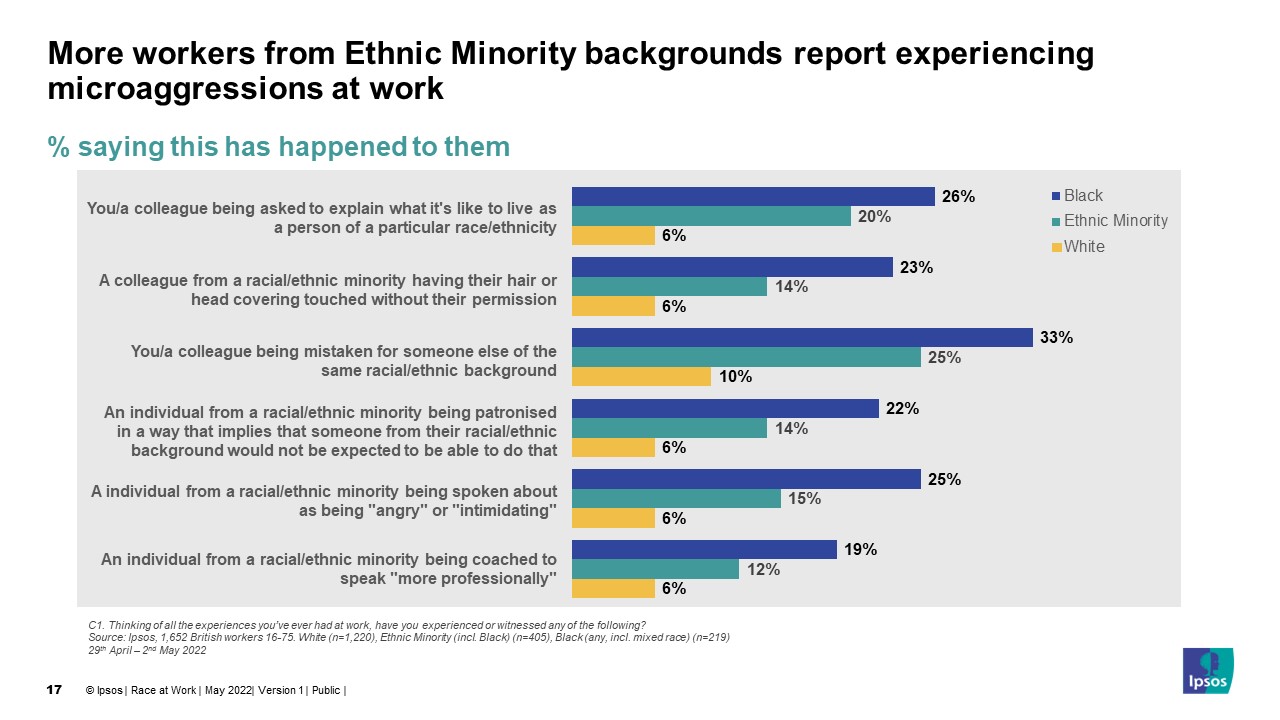2 years on: Understanding the work experiences of UK employees since the murder of George Floyd
- 41% of British workers say the murder of George Floyd two years ago has impacted the way their company handles race-related matter at least a little, increasing to 57% of those from ethnic minority backgrounds.
- However, although this impact mostly saw companies more willing to take action, only 43% of affected workers say this commitment has lasted.
- 6 in 10 agree their company is taking steps to ensure it creates an environment where people from different racial/ethnic backgrounds are included in the workplace.
- Workers from an ethnic minority background are more likely to report experiencing microaggressions in the workplace than white Britons. For example, 20% of workers from an ethnic minority background say they have personally experienced colleagues making racially insensitive statements, compared with 9% of white workers.
New research by Ipsos in the UK shows that around 4 in 10 (41%) working Britons have seen at least a small impact on the way their company handles race-related matters in response to the death of George Floyd in April 2020 (although only 12% say it has had a great deal of impact). This increases to almost 6 in 10 (57%) of workers from ethnic minority backgrounds. The research was carried out online between 29 April to 2 May, among 1,652 workers in full or part-time employment, or self-employed.
Of those who say they have seen an impact on the way their company deals with race-related matters, 43% say their company has become more willing to take action on race-related matters, and this remains to be the case today, with a further 21% saying their company became more willing to take action, but this has not lasted (rising to 30% of workers from an ethnic minority background who saw a change). In total, 16% saw their company become less willing to take action, with nearly 1/3 of this group (6% overall of those affected) saying their company’s lack of willingness has remained.
How do employees feel in their workplace?
Working Britons voiced some positive aspects when discussing their current workplace in terms of race, but also see areas for improvement. While six in 10 (61%) white working Britons agree their company is taking steps to ensure it creates an environment where people from different racial/ethnic backgrounds are included, this figure falls to 53% for workers from an ethnic minority background. Similarly, 7 in 10 (73%) respondents from white backgrounds agree they can be themselves at work without fear of bullying or harassment, falling to 60% of ethnic minority respondents. 63% of white Britons agree they feel valued at work – falling to half of ethnic minority respondents (49%).

However, there is room for improvement. Less than half of working Britons say the leaders/managers of their organisation are racially diverse (45%), with a similar proportion (47%) saying their company is proactively taking steps to become more racially diverse, such as seeking out candidates from under-represented groups.
In the two years since the murder of George Floyd, roughly half of workers feel their organisation has seen little change on various aspects of inclusion and diversity. However, among those who perceive a change, respondents were more likely to have seen an improvement than deterioration. Around three in ten (30%) felt their workplaces had made positive strides across areas including: the racial/ethnic diversity in their workplace; comfort with being themselves at work; comfort discussing matters related to race/ethnicity at work; the extent to which their organisations take a public stand against racial/ethnic inequality; racial/ethnic diversity in senior leadership at their workplace; and the amount of specific support their organisation offers to employees from racial/ethnic minority groups.
By contrast, fewer than 1 in 10 felt any of these dimensions had worsened compared to two years ago, although this tended to be slightly higher among ethnic minority respondents (but still a minority, and less than those who thought things were getting better).
Are people experiencing microaggressions in the workplace?
When asked about experiencing or witnessing microaggressions in the workplace, British workers are most likely to have experienced or heard about colleagues saying they are not racist (40% have ever either experienced themselves or seen/heard about it happening to a colleague), colleagues highlighting that they have friends of a different race or ethnicity to themselves (34%) or colleagues making racially insensitive statements (29%). Just under 3 in 10 say they have experienced or heard about others using racially offensive language (28%) or making racially colour-blind statements such as “I don’t see race” (27%).

However, workers from ethnic minority backgrounds are significantly more likely than average to report experiencing microagressions in the workplace. For example, 39% have experienced colleagues using racially offensive language themselves or heard about it happening to others, 41% have experienced or heard about others making racially insensitive statements, 42% colleagues making racially colour-blind statements, half (49%) have experienced or heard of colleagues highlighting that they have friends of a different race or ethnicity and 48% that those they work with say they are not racist.

Among those who have experienced microaggressions in the workplace, people are most likely to say they experience these things about the same amount as they did before the murder of George Floyd (between 40% and 50%) while around the same proportions say it happens more or less (around 20% for each).
Trinh Tu, Managing Director of Public Affairs at Ipsos, UK, said:
While the murder of George Floyd two years ago alerted employers into looking at ways to improve race relations, our latest data shows that this willingness has, in the main, not been translated into sustained and impactful actions for workers. Many workers, especially those from ethnic minority backgrounds, continue to experience microaggressions at work, highlighting that employers still have some way to go to create diverse and inclusive workplaces.
Technical note
Ipsos interviewed a representative quota sample of 1,652 workers (full time, part time or self-employed) aged 16-75 in Great Britain. This includes 405 interviews with those from an ethnic minority background (including 219 with those who described their ethnicity as Black, including those who identified as Black mixed with another race). Interviews took place on the online Omnibus using the Ipsos.Digital platform on 9th May 2022. Data has been weighted to the known offline population proportions for age, working status, social grade within gender, government office region and education.



